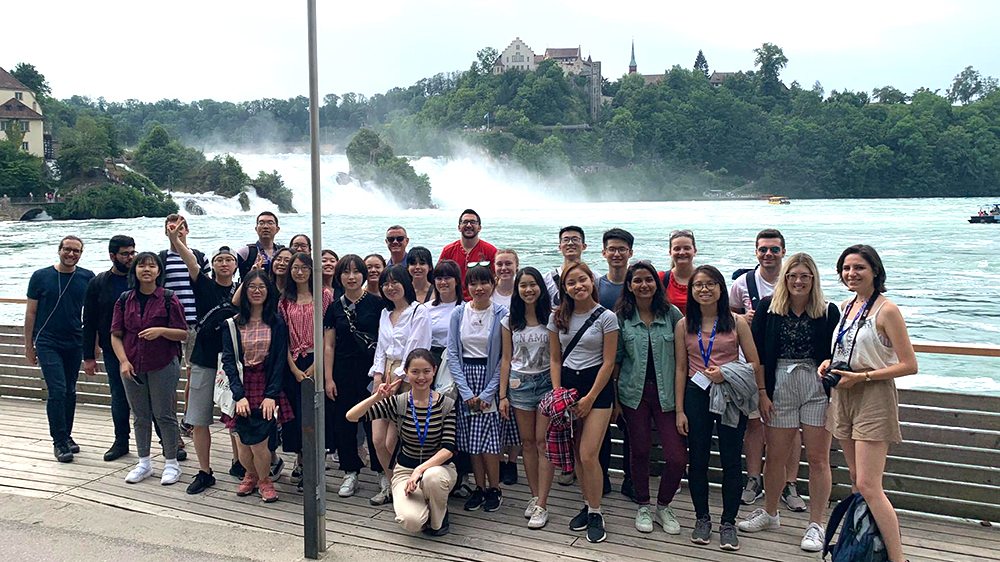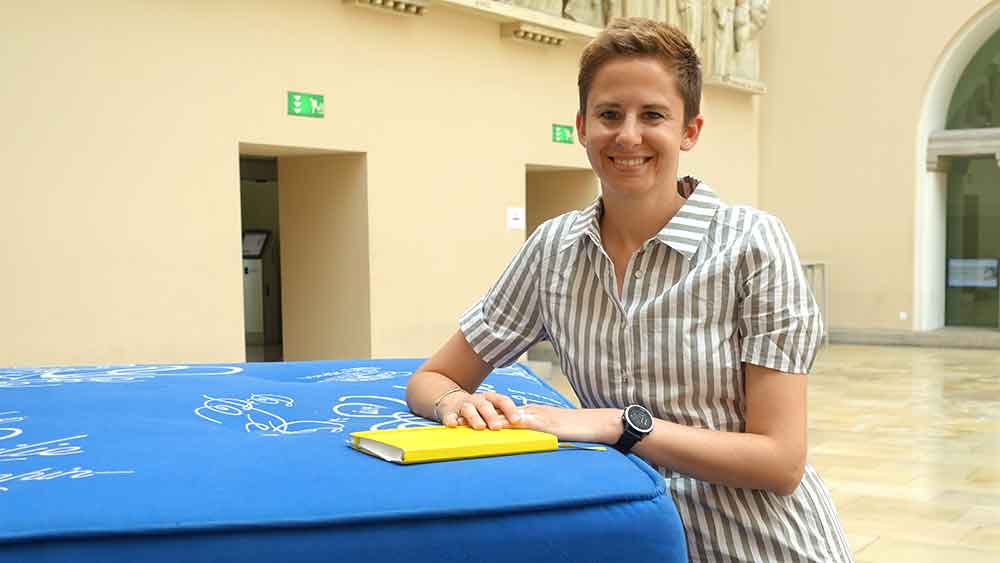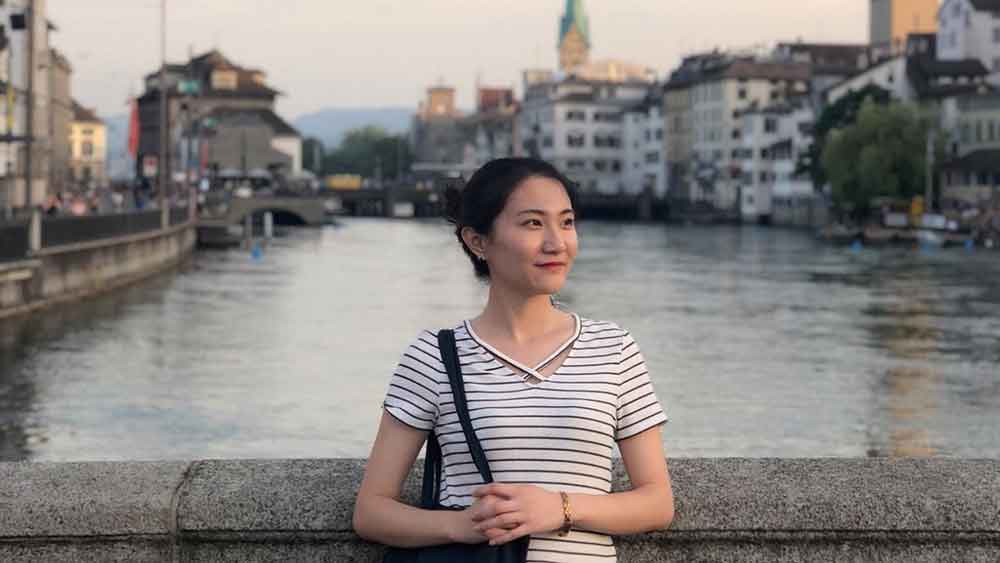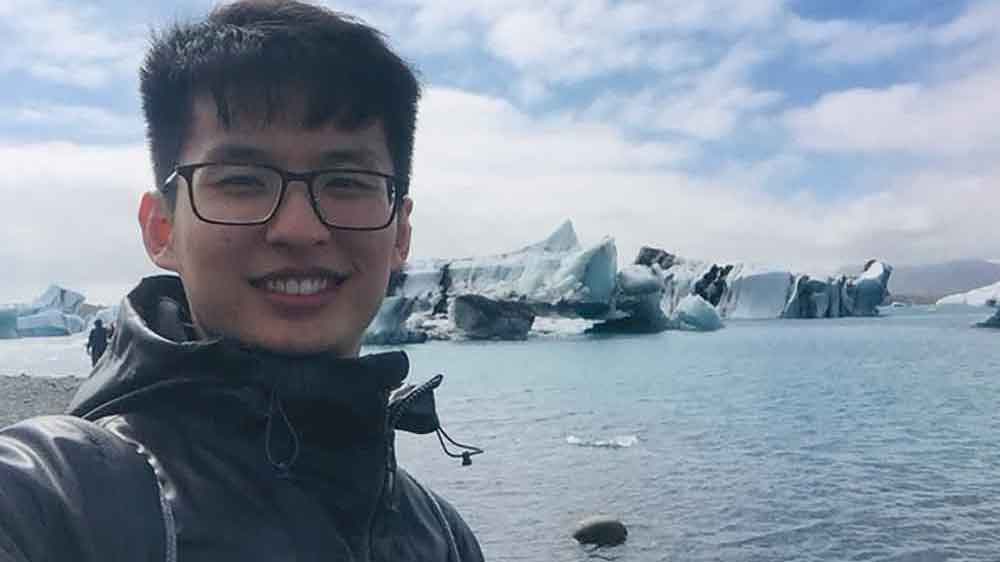Navigation auf uzh.ch
Navigation auf uzh.ch

Universities abroad, especially in the US, have offered seminars during the semester break for quite some time. The University of Zurich is currently holding its own summer schools for Bachelor’s and Master’s students from UZH and abroad for the second time. “Our experience with the summer school last year was excellent and the three courses we’re offering this semester have also met with great interest,” says Carmen Richard from the International Relations Office at UZH.
Carmen Richard is in charge of the overall coordination. She’s responsible for answering the students’ questions and liaising with the course instructors. “I haven’t switched off my mobile phone in the past few days,” she says, She’s happy about the fact that 59 foreign students have come to Zurich this summer, including several students from the University of Queensland in Australia, the National University of Singapore and the University of Johannesburg, all of which are UZH partner universities in Universitas 21, a global network of research universities. The questions she gets asked before the students arrive in Zurich range from visa issues to accommodation and course content to details such as clothing: “Many have asked whether there’s a dress code, since they’re not sure if they’re allowed to wear shorts in the classrooms, for example,” explains Richard.
Besides the academic content of the international summer schools, there are extracurricular activities that allow the students to get to know the local area as well as their new-found friends. Carmen Richard and her team in the International Relations Office are also in charge of this part. Summer school students can sign up for a social program up to three times a week. Activities offered in this program include museum tours, barbecues and film nights as well as hiking, sightseeing trips or getting together for a cheese fondue. “Last year, the students really wanted to try cheese fondue, so this year we’ve included it in our activities. Eating cheese fondue in temperatures of over 30 degrees was a unique experience, even for the Swiss among us,” says Richard with a smile.
The connection with Switzerland is a key aspect of promoting UZH’s summer schools. “One of the reasons why students choose to come to the University of Zurich is because they’re interested in topics that have to do with Switzerland or, in some cases, Zurich,” states Carmen Richard.

Summer schools are part of UZH’s internationalization strategy, through which the University of Zurich hopes to raise its profile internationally. So what makes these courses appealing to students? “You can take advantage of the time in between semesters to earn ECTS credits, gain experience abroad, build up networks, and explore a topic in depth,” explains Carmen Richard. Taking part in your own university’s summer school means you get to meet people from countries all over the world; in other words, UZH students can get a taste of international life without having to leave the country. Summer school is thus a good option for students who can’t or don’t want to leave their home country to spend a whole semester abroad.
The course on “How Switzerland Got Rich”, which was also offered last summer, proved very popular again. It gives students an insight into the sociological, historical, economic and political development of Switzerland. The course called “Finance for the Future: Sustainable Finance and FinTech” sheds light on the latest trends and developments of the Swiss banking sector as well as recent developments in the area of FinTech and sustainability. The third course focuses on intercultural communication skills and explores the complex skills needed to properly interact with members of different linguistic and cultural groups.
In addition to classroom teaching, which is made up of lectures, group work and presentations, summer school students also go on field trips to get to know more about Switzerland.
For more on these, you can read the three reports provided by students below.

"My name is Yuansi Gao, from University of Queensland. I’m so glad that the University of Zurich offered me an opportunity to come on an exchange to Switzerland this summer. Switzerland is one of the richest countries in the world with the most advanced financial systems and various giant transnational corporations. After two years’ study in the finance field, I am quite curious about how the financial systems work in developed countries. I wonder how Swiss companies manage to import and export goods with such a strong currency. I hope to learn more about Swiss industries, geography and politics and then compare them with those of Australia or China.
Here in Zurich, I have met impressive classmates from different cultures, very nice teachers and a good Airbnb host. Our summer course includes in-class teachings as well as outdoor guided tours. The university took care of our needs and arranged a variety of social activities to help students adapt to local life rapidly.
On the first summer school trip to Lucerne, I was shocked by its beauty, spectacular snow-topped mountains, lake and fascinating architecture. I also learned about the interesting history of medieval Europe and Switzerland from the visit to the Landesmuseum.
Currently I’m focusing on a case study of transnational companies and it’s so lucky that we’ll have a chance to visit the largest transnational food company, Nestlé, this week. I appreciate that the university offered me such a precious exchange and thank Carmen, Patrick and the other teachers for their help. It really is an unforgettable and impressive experience for me and I’m pretty sure that I’ll miss the time spent Switzerland after I go back to my home country."

"Apart from my wish to explore financial concepts in addition to my studies in law, I was also attracted to Zurich for various reasons, such as to see how beautiful the city is. As far as the city is concerned, we have had plenty of opportunities to explore Zurich. I am going to make the best out of it by joining most of the offered social events! The vibe of the summer school has been great.
During class, we have not only got a taste of life as a student of the University of Zurich, but also ample chances to mingle with distinguished scholars, teachers and students from the relevant fields. I am particularly impressed by the mode of assessment which was applied and practice-oriented. Unlike the procedure of a traditional assessment (e.g. written exam), we get to work for a fictitious Swiss bank and provide some hands-on advice to fictitious clients by applying the newly acquired concepts.
Thus far, I am very satisfied and indeed really happy to be here. What, however, goes beyond my expectations is the heartfelt welcome from the University of Zurich and its student representatives. The moments we have shared, the jokes we laughed about, the thoughts we exchanged, both of intercultural and interdisciplinary nature, all of these have made my summer unique. Quite frankly, I did not see any of this coming. Suffice to say, the experience of this summer school has more than lived up to its promise."

"I am a student from the University of Johannesburg and I am originally from Lesotho. I applied for the program “Intercultural Competence” and I must admit it has been a perfect choice. My first impression of Zurich was complete awe of the impressive scenery and well-organized clean town. It is very advanced with well-established transport systems and infrastructure. The University building is quite easy to get around for me.
I have learned so much about intercultural communication and the significance of the intercultural differences when communicating with anyone. Additionally, even when two people come from the same geographical location they can have an intercultural communication since it is based on so many other factors e.g. religion, traditional beliefs, education, to mention but a few. In my language when something is this good we say “Ke mohloka koli” which directly translates as “it has no flaws”. My first week in this program has been nothing but amazing."